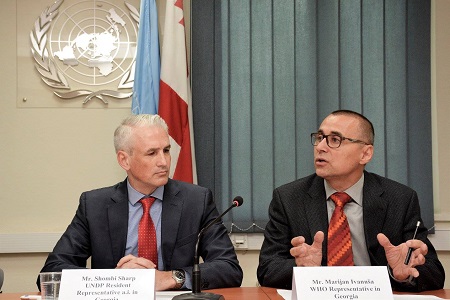UN supports comprehensive tobacco-control legislation in Georgia

The United Nations (UN) welcomes the efforts of the Government and the Parliament of Georgia to address tobacco smoking – an issue on which Georgia is one of the worst performing countries.
Representatives of the World Health Organization (WHO) and United Nations Development Programme (UNDP) called a press conference today to support the adoption of the Tobacco-Control Law in Georgia.
UN representatives stressed that the draft legislation being considered by the Parliament this week would be a significant step forward in saving lives, growing the economy and further integrating the country with the European Union (EU).
"Passage of the draft legislation would align Georgia with its obligations as a Party to the WHO Framework Convention on Tobacco Control (FCTC), and help meet Article 356 of the EU-Georgia Association Agreement, which makes FCTC implementation a pre-condition for further European integration”, UNDP representatives said.
"Tobacco use is the leading preventable cause of morbidity and premature mortality and it is critical that Georgia endorses comprehensive and strict tobacco control legislation”.
They also reviewed statistics and said that in Georgia, the prevalence of smoking among men is among the highest in the world at approximately 57 percent; the prevalence of smoking among women, despite still being relatively low, has almost doubled in the recent years.
It was also mentioned that approximately 11,000 citizens of Georgia die prematurely every year from diseases caused by tobacco, and among those are approximately 3,000 non-smokers.
"The alarming figures clearly indicate a need for strong and imminent action in tobacco control”, they said.
The UN Country Team in Georgia also informed about the preliminary findings of the FCTC Investment Case – recent research implemented by the WHO and UNDP to promote implementation of the WHO Framework Convention on Tobacco Control (FCTC) in Georgia.
The results indicate that tobacco costs the Georgian economy roughly 2 percent of GDP per year. By implementing a legislative package such as the one proposed, Georgia could save approximately GEL 27 million per year (assuming a reduction of 2 percent in smoking prevalence per year.
Georgian Parliament is currently discussing the legislative package to toughen control on tobacco use. One of the important aspects of the draft law is a complete ban on smoking in all indoor public places (excluding casinos and cigar bars). If supported by lawmakers, the ban will come into force in May of 2018.
The preliminary findings of the FCTC Investment Case said that this measure - the complete ban on smoking in all indoor public places - would lead to a relative decrease of 5.4 percent in smoking prevalence in five years in Georgia.
It also indicated that with the strong set of policies consistent with the WHO FCTC, smoking prevalence can be reduced by 40 percent within five years in the country.
 Tweet
Tweet  Share
Share